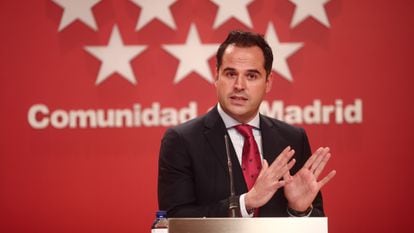Delays in Covid-19 vaccine shipments slow down campaign in Spain
The Madrid region says it is halting first-dose inoculations for two weeks to ensure there are enough second shots for everyone who needs them
/cloudfront-eu-central-1.images.arcpublishing.com/prisa/NQV67A2S3RHQ7NXJBDPM2GKTUY.jpg)

Delays in Covid-19 vaccine deliveries are complicating the inoculation drive in Spain. After Pfizer last week announced a temporary reduction in shipments, another major vaccine supplier, Moderna, on Wednesday said deliveries would be pushed back a few days. And supplies of the AstraZeneca vaccine, which is slated for approval by European authorities tomorrow, will also take longer than expected.
These delays are affecting regional governments’ inoculation plans in different ways. Officials from a majority of Spanish regions told this newspaper that they are being forced to make small adjustments to their original plans.
Catalonia and Andalusia have also reported problems due to shipment delays
But Madrid on Wednesday announced that it was putting a two-week freeze on first-dose administration to make sure that everyone who has had their first shot receives the second jab within the required deadline. This will delay the vaccination of some healthcare workers.
This change of plan is not justified by the reduction in shipments. Deliveries of the Pfizer vaccine, which represents most of the shots being administered in Spain right now (Moderna accounts for 1%) suffered a delay last week that held back 44% of expected doses. In other words, regional governments received only 196,000 doses instead of the 350,000 they had been expecting. This calculation is based on five doses out of every vial, even though the EU has already approved the practice of extracting six doses, which many vaccination teams are already doing.
The agreed number of doses arrived this week, and the company has pledged to up its production by mid-February to make up for the delay.
Madrid’s vaccination drive got to one of the slowest starts in Spain, and the Health Ministry made readjustments so that the fastest regions could start administering the second doses 21 days after the first. According to the drugmaker’s indications, however, it is possible to wait up to 42 days without losing effectiveness.
Political battle

Madrid alleges that it has been forced to stop administering first doses for the next two weeks due to a shortage of vaccines. The announcement was made on Wednesday by regional deputy premier Ignacio Aguado, who accused the central government of not delivering enough vaccines to meet the agreed schedule. According to Health Ministry records, the region has to administer 162,880 second doses in the coming days.
“This week and the next we are being forced to halt first-dose administration and focus on second doses, which are so necessary,” said Aguado. “We urgently need more doses.”
In the Madrid region, only 4,073 people have already had both doses, representing 2% of all received doses. In Andalusia, this figure rises to 37,978 (15%), in Galicia it is 12,042 Galicia (18%) and it Asturias it is 10,694 (24%).
Catalonia has also reported problems. Around 10,000 people will receive their second shots more than 21 days after the first one, and the regional government on Wednesday said there was a “serious” supply problem. The Catalan public health secretary, Josep Maria Argimon, said that the current pace of vaccination is limiting original plans to immunize 70% of the population by the summer.
Similarly, Andalusian premier Juan Manuel Moreno has warned that if shipments are not increased, only 15% of the population will be vaccinated by the summer.
EFFECTS WITHIN 10 DAYS
Early data reported by the Catalan government suggests that the first dose of the Pfizer-BioNTech vaccine reduces the risk of contracting Covid-19 by more than half after just 10 days of administration, compared to unvaccinated individuals. “We are starting to notice the effect in care homes. This is very important because it will help us control the situation,” said Carmen Cabezas, the deputy director general of health promotion.
With reporting by Pablo Linde, Isabel Valdés, Juan José Mateo, B. Coll, C. Bermeo, E. Saiz and M. Ormazabal.
English version by Susana Urra.
/cloudfront-eu-central-1.images.arcpublishing.com/prisa/YRY6EI36P5ASPBWFGQTOBYO44M.jpg)
/cloudfront-eu-central-1.images.arcpublishing.com/prisa/PS2KOTYFHGENEFIDXERRF5HBWQ.jpg)










































